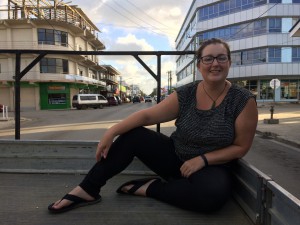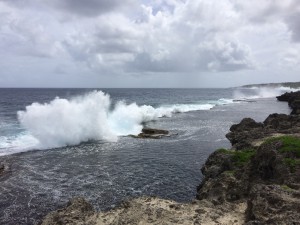After finishing up in Paediatrics, I moved to emergency care for two weeks. The emergency room was staffed by one doctor and a couple of nurses,  one of which was also the ambulance medic if anyone had a call out. This was where I spent a lot of time as a first responder. Often there is not enough staff to send a doctor in the ambulance.These call outs reminded me of my time doing PRIME on RMIP. It was a buzz that I enjoyed, acute medicine is a major draw for me to do rural general practice in the future. The range of things I was called to was vast, but the experience was excellent. I had suddenly become very grateful for a late night, middle of winter mock farming accident on RMIP with Buzz. I was thrown into a range of situations in Tonga that I was equipped for because of lessons from that night.
one of which was also the ambulance medic if anyone had a call out. This was where I spent a lot of time as a first responder. Often there is not enough staff to send a doctor in the ambulance.These call outs reminded me of my time doing PRIME on RMIP. It was a buzz that I enjoyed, acute medicine is a major draw for me to do rural general practice in the future. The range of things I was called to was vast, but the experience was excellent. I had suddenly become very grateful for a late night, middle of winter mock farming accident on RMIP with Buzz. I was thrown into a range of situations in Tonga that I was equipped for because of lessons from that night.
1 Your safety is paramount. This became evident when I attended an electric shock victim in a tree.
2 You can do a lot with a guedel and bag mask. – As we flew through traffic to get the hospital with a chap who’d lost consciousness after being short of breath, I realised this had probably saved his life.
3 Roll the pregnant woman in the MVA onto her left if she’s dropping her BP. It might save her life. In that case, it did.
4 Be worried about the crying kid, but be much more worried about the one who’s gone quiet suddenly. This one turned out to be end stage septic shock, which was successfully resuscitated with some quick thinking.
Each time I struck a new scenario I thought, okay. Take a deep breath. What will you do now. Is it safe? ABC. What would you do in that paddock in Blenheim? What has RMIP taught you?
It taught me to think. It taught me to problem solve. It taught me to be practical.
It taught me to be a good doctor and I couldn’t have been more grateful.
As I finish up here in the Kingdom, I move on to Melbourne next week where I’ll be attending the Leaders in Indigenous Medical Education (LIME) conference for a week.

No comments yet.
Leave a comment